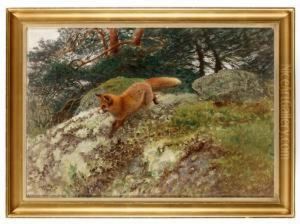August Von Schantz Paintings
August von Schantz was a Finnish painter and military officer, whose life spanned from 1825 to 1902. Born into the era of the Grand Duchy of Finland under the Russian Empire, von Schantz's life and work were marked by the confluence of Finnish nationalism and a broader European artistic sensibility. His career is a testament to the diverse paths an artist can traverse, melding military discipline with a profound artistic vision.
Von Schantz embarked on his military career in the Finnish Army, a path that was not uncommon for men of his standing and background. However, unlike many of his contemporaries, he did not confine his talents and ambitions to the military sphere. Inspired by the romantic movements sweeping through Europe, von Schantz sought to express his artistic urges, finding in art a counterpoint to his military life. He pursued his artistic studies with fervor, studying in various parts of Europe, which was a common practice among aspiring artists of his time seeking to broaden their horizons and refine their techniques.
Despite the dual nature of his career, von Schantz is primarily remembered today for his contributions to the Finnish art scene. His works often reflect the romantic nationalism that was a significant cultural force in 19th-century Europe, including Finland. This movement sought to elevate the national landscape, folklore, and history as sources of artistic inspiration, and von Schantz's paintings resonate with this intent. His landscapes and scenes of Finnish life are imbued with a sense of national identity and pride, serving as visual narratives of Finland's cultural heritage.
Von Schantz's legacy is not merely in the paintings he left behind but in his embodiment of the spirit of his time. He navigated the complexities of a career in the military while simultaneously contributing to the burgeoning Finnish art scene. His life illustrates the broader cultural currents of 19th-century Europe, where national identity, romanticism, and personal expression found common ground. August von Schantz died in 1902, but his works continue to be celebrated for their beauty and historical significance, offering insight into the soul of Finland during a pivotal era in its history.
